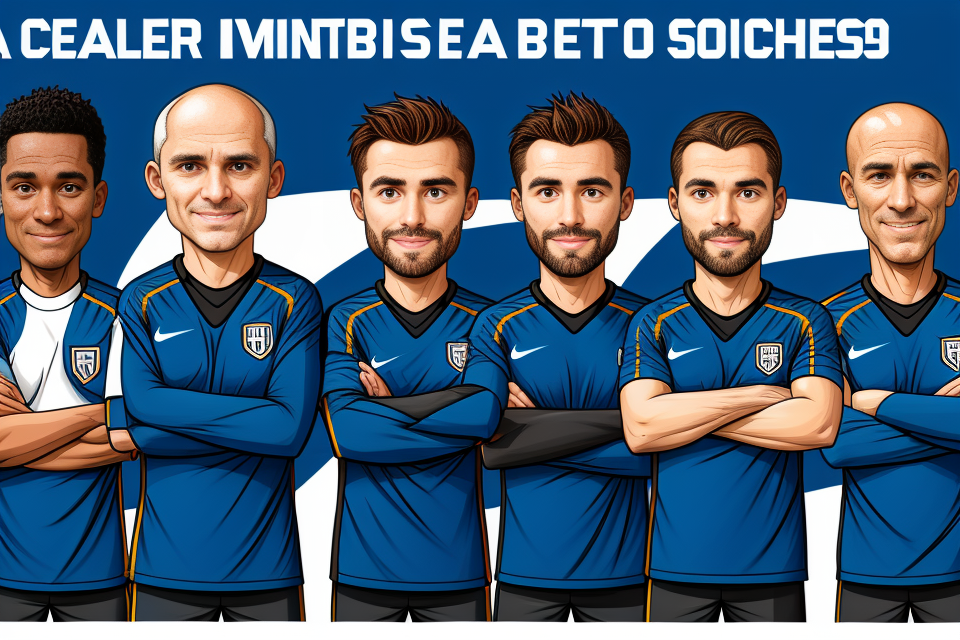Dealing with a bad soccer coach can be a daunting task for both players and parents. A toxic coach can make the sport less enjoyable and hinder the growth and development of young players. But how do you effectively deal with a coach who is not meeting your expectations? This guide offers practical advice and strategies for navigating difficult coaching situations, empowering players and parents to advocate for themselves and promote a positive soccer experience.
How to Identify a Bad Soccer Coach
Common Signs of a Toxic Soccer Coach
- Verbally abusive or humiliating players
- Screaming at players, belittling them in front of their peers, or using derogatory language towards them.
- Constantly criticizing players without providing constructive feedback or acknowledging their achievements.
- Using fear and intimidation to motivate players, rather than fostering a positive and supportive environment.
- Favoritism and unfair treatment
- Showing clear bias towards certain players, regardless of their skill level or performance.
- Playing favorites when it comes to playing time, team positions, or other opportunities.
- Ignoring or disregarding the needs and concerns of certain players in favor of others.
- Lack of clear communication or feedback
- Failing to communicate expectations and goals for the team or individual players.
- Providing inconsistent or unclear instructions during practice or games.
- Ignoring or dismissing player feedback or concerns.
- Inability to adapt coaching style to players’ needs
- Using a one-size-fits-all approach to coaching, without taking into account the individual strengths and weaknesses of players.
- Failing to adjust coaching style or strategies based on players’ progress or changing circumstances.
- Refusing to accommodate players with injuries or other physical limitations.
- Poor game strategy or decision-making
- Making illogical or poorly thought-out decisions during games.
- Failing to adapt to changing game conditions or opposing team strategies.
- Ignoring or undervaluing the contributions of certain players during games.
Red Flags to Watch Out For
Consistently Negative Attitude
A bad soccer coach may consistently display a negative attitude, which can be detrimental to the players’ mental and emotional well-being. Look out for a coach who is frequently irritable, pessimistic, or sarcastic. They may make demeaning comments, criticize players excessively, or belittle their efforts. This kind of behavior can erode a player’s confidence and motivation, leading to a negative experience in soccer.
Unrealistic Expectations
Another red flag to watch out for is a coach who sets unrealistic expectations. They may demand unattainable levels of performance from players, often without considering their skill level or physical limitations. This can lead to frustration, burnout, and injuries among players. Additionally, unrealistic expectations may cause undue pressure on players, making them feel like they constantly have to prove themselves.
Overemphasis on Winning at All Costs
A toxic soccer coach may place an excessive emphasis on winning, often at the expense of player development and well-being. They may prioritize victories over player growth, technique, or sportsmanship. This can create a highly competitive and toxic environment, where players feel pressure to win above all else. An overemphasis on winning can also lead to favoritism, as the coach may show more attention to players who perform better or are more physically gifted.
Lack of Concern for Player Well-being
A bad soccer coach may exhibit a lack of concern for player well-being, both physically and mentally. They may not provide adequate rest, hydration, or nutrition for players during training sessions or games. Additionally, they may fail to recognize signs of injury or illness and continue to push players beyond their limits. This lack of care can result in injuries, burnout, or long-term health consequences for players.
Refusal to Take Responsibility for Mistakes
A toxic soccer coach may refuse to take responsibility for their own mistakes or the team’s performance. They may blame players, officials, or external factors for losses or setbacks. This can create a culture of defensiveness and avoidance, where players may feel discouraged from taking responsibility for their actions or learning from their mistakes. A coach who refuses to accept responsibility can also erode trust and respect among players, leading to a dysfunctional team dynamic.
What to Do If You Have a Bad Soccer Coach
Communicate Your Concerns
If you find yourself in a situation with a toxic soccer coach, it’s important to address your concerns in a constructive manner. Here are some steps to follow:
- Approach the coach privately: It’s important to have a one-on-one conversation with the coach rather than discussing your concerns in front of the team or other parents. This shows that you’re willing to have an open and honest dialogue.
- Be specific and provide examples: When discussing your concerns, be specific about what behavior or actions you find problematic. Provide concrete examples of what happened and how it made you feel. This will help the coach understand the impact of their behavior on you and others.
- Suggest potential solutions: Instead of just complaining about the problem, suggest potential solutions that could help improve the situation. This shows that you’re invested in finding a solution and not just criticizing the coach. For example, you could suggest additional training sessions to improve ball control, or offer to provide feedback on game strategy.
It’s important to approach this conversation with an open mind and a willingness to listen to the coach’s perspective as well. Remember that the goal is to improve the situation for everyone involved.
Seek Support from Others
If you are dealing with a toxic soccer coach, it is important to seek support from others who may be able to provide guidance and assistance. Here are some steps you can take:
- Talk to teammates and parents: It can be helpful to talk to other players and parents who may be experiencing similar issues with the coach. This can provide a sense of community and support, and you may be able to come up with strategies for dealing with the coach together.
- Consult with a trusted coach or mentor: If you have a trusted coach or mentor who has experience in soccer, they may be able to provide advice on how to handle the situation. They may also be able to offer guidance on how to communicate with the coach and how to set boundaries.
- Consider speaking with the club or league administrator: If the issues with the coach are severe or affecting the entire team, it may be necessary to speak with the club or league administrator. They may be able to provide support and guidance on how to address the situation, and may even be able to take action to remove the coach from their position.
Document Incidents and Injuries
Keep a Record of Any Incidents or Abuse
When dealing with a toxic soccer coach, it is important to document any incidents or abuse that occurs. This can include things like verbal abuse, physical abuse, or any other inappropriate behavior. It is important to keep a detailed record of these incidents, including the date, time, location, and any witnesses. This can be helpful in case you need to report the behavior to a higher authority or take legal action.
Report Any Injuries or Unsafe Coaching Practices
If you are injured while under the supervision of a toxic soccer coach, it is important to report the injury as soon as possible. This can help prevent further injuries and ensure that you receive proper medical treatment. Additionally, if you witness any unsafe coaching practices, such as overtraining or excessive criticism, it is important to report these as well. This can help protect other players from being subjected to similar treatment and can lead to positive changes within the team or organization.
Consider Alternatives
- Transfer to a different team or club
- Evaluate other options: Research local teams or clubs and their coaches, consider factors such as playing style, team culture, and location.
- Consult with other players: Discuss experiences and opinions with teammates who may have faced similar situations.
- Meet with the coach or team representative: Discuss your concerns and determine if the team or club is willing to address the situation.
- Make a decision: Weigh the pros and cons of transferring and consider what is best for your soccer development and overall well-being.
- Seek additional coaching or training outside of the team
- Identify areas of improvement: Determine the specific skills or knowledge you want to develop and look for coaches or trainers who specialize in those areas.
- Research options: Look for local coaches, trainers, or academies that offer individual or group sessions.
- Set goals: Establish clear objectives for your training and communicate them to your coach or trainer.
- Balance team and individual training: Ensure that additional training does not interfere with your commitment to the team and prioritize team training and matches.
- Explore other sports or activities
- Broaden your horizons: Consider trying other sports or activities that can help develop physical and mental skills that are transferable to soccer.
- Evaluate options: Research local clubs, teams, or programs that align with your interests and schedule.
- Balance commitments: Ensure that new sports or activities do not interfere with your soccer schedule and prioritize your soccer commitments.
- Maintain a healthy balance: Engage in a variety of activities to avoid burnout and maintain overall well-being.
How to Support Your Child Through a Difficult Coaching Situation
Open Communication
Open communication is a crucial aspect of supporting your child through a difficult coaching situation. Here are some ways to facilitate open communication:
Encourage your child to express their concerns
Create a safe space for your child to express their feelings and concerns about the coaching situation. Allow them to share their experiences without judgment, and assure them that their feelings are valid.
Listen actively and offer support
When your child shares their concerns, listen actively and empathetically. Ask open-ended questions to better understand their perspective, and offer emotional support to help them feel heard and validated.
Work together to develop a plan
Once you have a clear understanding of your child’s concerns, work together to develop a plan to address them. This may involve speaking with the coach, seeking support from a sports psychologist, or exploring other options to help your child feel more comfortable and confident in their soccer environment.
By fostering open communication, you can help your child navigate a difficult coaching situation and ensure that their needs are being met both on and off the field.
Focus on the Positive
When dealing with a toxic soccer coach, it can be challenging for both players and parents to maintain a positive outlook. However, focusing on the positive aspects of the game can help your child stay motivated and resilient. Here are some ways to emphasize the positive:
- Emphasize the aspects of the game that your child enjoys: Encourage your child to focus on the things they love about soccer, such as scoring goals, passing to teammates, or making tackles. By highlighting these positive experiences, your child will feel more confident and enthusiastic about playing the game.
- Celebrate their successes and progress: Acknowledge your child’s achievements, no matter how small they may seem. This could be something as simple as scoring a goal in a game or demonstrating improved ball control during practice. Celebrating successes helps to reinforce positive behaviors and provides a sense of accomplishment for your child.
- Reinforce the importance of effort and hard work: Sometimes, players may feel discouraged by the negative comments or criticism from a toxic coach. Encourage your child to remember that effort and hard work are the keys to improvement. Remind them that they have control over their attitude and work ethic, regardless of the coach’s behavior.
By focusing on the positive aspects of the game, players and parents can create a supportive environment that helps to mitigate the negative effects of a toxic coach. This approach can also help to foster a growth mindset, where your child understands that challenges and setbacks are opportunities for growth and learning.
Set Boundaries and Limits
As a parent, it is essential to support your child and help them navigate a difficult coaching situation. One way to do this is by setting boundaries and limits. Here are some ways to do that:
Encourage your child to set personal goals
Setting personal goals can help your child feel empowered and motivated. Encourage them to set realistic and achievable goals for themselves, both on and off the field. This will help them focus on their strengths and develop their skills, rather than feeling overwhelmed by the coach’s demands.
Help them prioritize their mental and physical health
A toxic coach can take a toll on your child’s mental and physical health. As a parent, it is essential to help them prioritize their well-being. Encourage them to take breaks when needed, and help them develop healthy coping mechanisms for dealing with stress and anxiety.
Set realistic expectations for their performance
It is essential to set realistic expectations for your child’s performance, both on and off the field. Remember that everyone has different strengths and weaknesses, and it is okay if your child doesn’t excel in every aspect of the game. Encourage them to focus on their progress and celebrate their successes, no matter how small they may be.
By setting boundaries and limits, you can help your child feel more in control of their situation and empower them to make positive changes.
Legal Considerations and Protections
Know Your Rights
As a player or parent, it is important to know your rights when dealing with a toxic soccer coach. Here are some key points to keep in mind:
- Understand the rules and regulations of your club or league: Familiarize yourself with the policies and procedures of your soccer organization. This includes understanding the process for reporting abuse or mistreatment, as well as the consequences for toxic behavior by coaches.
- Know your rights as a player or parent: Be aware of the protections that are in place to ensure a safe and positive soccer experience for all participants. This may include the right to a safe and respectful environment, the right to be treated fairly and with dignity, and the right to report abuse or mistreatment without fear of retaliation.
- Educate yourself on state and federal laws: It is important to understand the legal protections that are in place to prevent discrimination, harassment, and abuse in sports. This may include laws related to equal opportunity, Title IX, and child abuse reporting requirements.
- Seek legal advice if necessary: If you believe that your rights have been violated or if you are facing legal issues related to your soccer experience, it may be helpful to seek advice from a lawyer or legal professional. They can help you understand your rights and options, and guide you through the process of seeking justice.
Document Everything
When dealing with a toxic soccer coach, it is important to document everything. This includes keeping records of any incidents or abuse that occur during practices or games. It is crucial to document everything as it can serve as evidence in case legal action needs to be taken.
Here are some tips for documenting everything:
- Keep a journal or log of all incidents or abuse. Include the date, time, location, and details of what occurred.
- Take photos or videos of any injuries or incidents that occur during practices or games.
- Save any emails, texts, or other forms of communication from the coach that are relevant to the situation.
- Keep a record of any conversations with the coach or other authorities regarding the situation.
It is important to report any concerns to the appropriate authorities. This includes reporting any incidents of abuse or mistreatment to the soccer club or organization, as well as to the relevant legal authorities if necessary.
It is important to note that documentation is crucial in building a strong case against a toxic soccer coach. However, it is also important to seek legal advice before taking any legal action. A lawyer can provide guidance on the best course of action and help protect the rights of the player or parent.
Seek Legal Advice
If you are experiencing toxic behavior from a soccer coach, it is important to understand your legal rights and options. Seeking legal advice can help you navigate the complexities of the situation and determine the best course of action.
Consult with a lawyer specializing in sports law
A lawyer who specializes in sports law can provide you with guidance on the specific legal issues related to your situation. They can help you understand your rights as a player or parent, and advise you on the best way to proceed.
Explore legal options for redress
Depending on the severity of the situation, there may be legal options available to you for redress. These could include filing a complaint with the soccer governing body, taking legal action against the coach, or seeking damages for any harm caused.
It is important to note that legal action should always be a last resort, and that other avenues such as communication with the coach or the soccer organization should be explored first. However, having a lawyer’s advice can help you understand when it may be necessary to take legal action, and what steps you can take to protect your rights.
Support Your Child’s Mental Health
Seek professional help if necessary
- Consult with a licensed mental health professional, such as a psychologist or counselor, who specializes in working with children and adolescents.
- Explore group therapy or support groups for children and families dealing with similar issues.
- Utilize online resources, such as websites and apps, that offer mental health support and self-care tools for children and teenagers.
Encourage your child to talk about their feelings
- Create a safe and non-judgmental space for your child to express their thoughts and emotions.
- Ask open-ended questions and listen actively to understand their perspective.
- Validate their feelings and reassure them that it is okay to feel hurt or upset.
Practice self-care and set a positive example
- Prioritize your own mental health and well-being, as this will indirectly benefit your child.
- Engage in activities that promote relaxation and stress reduction, such as exercise, meditation, or hobbies.
- Demonstrate healthy coping strategies and positive communication skills in your interactions with your child and others.
It is essential to support your child’s mental health when dealing with a toxic soccer coach. Seeking professional help, encouraging open communication, and practicing self-care can all contribute to maintaining a healthy emotional state for your child.
FAQs
1. What should I do if I have a bad soccer coach?
If you have a bad soccer coach, the first step is to assess the situation and determine the root of the problem. Is the coach’s coaching style not working for you? Are they being verbally abusive or pushing you too hard? Once you have identified the issue, you can decide on the best course of action. If the coach is not meeting your needs or treating you fairly, it may be time to talk to a higher authority, such as the team manager or club president. Alternatively, you could consider talking to the coach directly and expressing your concerns in a respectful manner.
2. How can I tell if my soccer coach is bad?
There are several signs that may indicate that your soccer coach is not doing a good job. Some of these include:
* They are not communicating effectively with the team or individuals
* They are not providing clear instructions or feedback
* They are not focusing on player development or building team cohesion
* They are verbally abusive or belittling to players
* They are not adapting their coaching style to the needs of the team or individual players
If you notice any of these issues, it may be time to speak up and address the problem.
3. What should I do if my soccer coach is verbally abusive?
If your soccer coach is verbally abusive, it is important to take action to protect yourself and other players. First, document any incidents of abuse, including dates, times, and specific comments or actions. Next, speak with a trusted teammate or parent to get their perspective and support. You may also want to talk to a higher authority, such as the team manager or club president, about your concerns.
It is important to remember that you have the right to be treated with respect and dignity, and that verbal abuse is not acceptable behavior from a coach. If the situation is not resolved, you may need to consider leaving the team or seeking legal assistance.
4. How can I improve my relationship with a difficult soccer coach?
If you have a difficult soccer coach, it can be challenging to improve your relationship with them. However, there are a few strategies that may help:
* Be proactive in communicating with the coach and seeking feedback on your performance
* Show up to practice and games prepared and ready to work hard
* Be respectful and professional in your interactions with the coach, even if you disagree with their coaching style or decisions
* Seek out additional coaching or mentorship from other sources, such as a private coach or a trusted teammate
Remember that improving your relationship with a difficult coach may take time and effort, but it is worth it if it means that you can continue to grow and develop as a soccer player.



